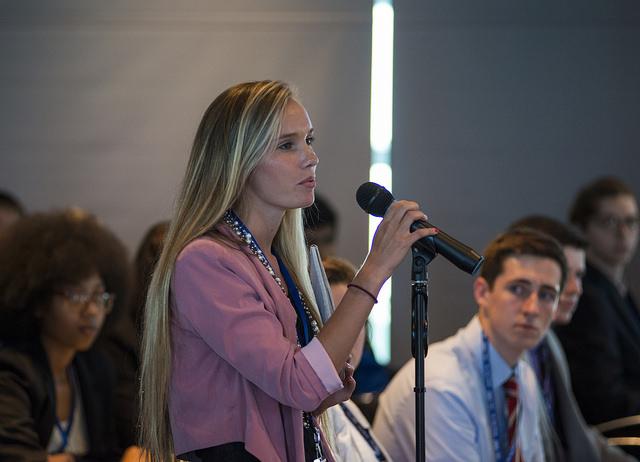Al Neuharth Free Spirit and Journalism Conference Inspires Young Journalists
Homecoming 2014
I arrived in Washington, D.C. on June 21st with a mixture of fear and excitement. After a few weeks of summer relaxation, I transitioned to a week jam-packed with presentations, several Q&A’s, and late night visits to historic sites in D.C. Last but not least, I interacted with fifty other rising high school seniors as a part of the Al Neuharth, Free Spirit and Journalism Conference. Fifty-one high school journalists, selected from each state and D.C, attended the conference.
During this six-day conference, there was nonstop discussion on the importance of journalism. The speakers, ranging from social media specialists to popular news broadcasters, shared thoughtful reflections on the importance of this field and how they hope it will evolve. The Free Spirit class toured the Newseum, the Capitol, NBC studios, and various other sites in D.C. Participants also had the opportunity to listen to an impressive and diverse set of speakers, including Gwen Ifil, moderator of “Washington Week”and the 2004 and 2008 Presidential Debates, and co-anchor of the “PBS NewsHour” and Congressman John Lewis, a participant of the Freedom Rides in 1961.
This is the second year the conference has taken place without Al Neuharth, founder of USA Today, who passed away in April 2013. His legacy, however, had an enormous impact on the program. Participants had the opportunity to listen to his daughter, Jan Neuharth and grandchildren speak about his career and his character. Listening to his family, we learned that Neuharth fully lived by the Free Spirit slogan that he titled: “Dream, dare, do.” Neuharth had a difficult upbringing. He was raised in a single-parent household after his dad died from tuberculosis. Neuharth’s first attempt at publishing a local paper, SoDak Sports, was an immense failure. However, Neuharth held the ideal that “Little league failures lead to Big League success.” After SoDak Sports, Neuharth worked for the Miami Herald and progressed up the professional ladder, becoming CEO of the Gannet Company and founding USA Today in 1982. Many criticized USA Today, referring to it as the “McPaper” of newspapers for solely attempting to please people through its color print and terse writing style. Despite the criticism, Neuharth worked relentlessly for USA Today to provide news that would inform and entertain readers in ways unlike the traditional papers of the time.
The Free Spirit class had the opportunity to listen to other speakers who faced criticism as journalists. Print journalism is widely regarded as “dying,” as more and more people get news coverage online, through cell phones, or on television. Sarah Ganim, CNN correspondent and 2012 Pulitzer Prize winner, gave the Free Spirit class advice on how to address criticism. Ganim advised us not to get caught up in criticism of journalism as a profession because criticism comes with every profession. She cited that there are “too many lawyers out there” or “you’ll have 200,000 dollars debt in med school loans”. However, she did advise Free Spirits to develop skills on multiple platforms in journalism. Ganim initially started out as a reporter for a local paper as a college reporter, later worked radio shows, and started shooting video clips to build her portfolio. She told participants that anyone can become a better writer with repetition, but with diversified skill sets we can become a lot more marketable when applying for jobs. The conference also addressed another face of criticism: the quality of our news. In the midst of the ISIS Crisis and the Ferguson protests in Missouri, the demand for accurate and objective news is higher than ever. So often our news sources become too polarized or politicized, making it challenging for readers to uncover the truth. The program’s emphasis on the First Amendment rights helped inform the Free Spirit class on the rights of journalists and gave us insight into how professionals constantly struggle to provide balanced news coverage.
With a lot of perspective on the criticism of journalism, majoring in journalism was one of the primary concerns Free Spirits inquired about. After viewing “Meet the Press” with David Gregory, we watched him moderate news coverage ranging from ISIS threats in the Middle East to 2014 World Cup predictions. Amazed at both his talent and topics of discussion, I fully expected him to encourage us to study broadcast journalism in college during the Q&A. Conversely, he told us not to study journalism in college, but to major in something of specific interest to us, such as international relations, and stay updated with technology developments in the field of journalism. Like Gregory, many of the presenters did not stress majoring in journalism in college as a make or break factor to our careers as journalists. Ron Nessen, veteran journalist and press secretary of President Gerald Ford shared: “Everyone is a journalist if they have a cell phone or key board.” Nessen emphasized how the growing technologically may cause the decline of print journalists, but shared how the growing opportunities for more people to become journalists makes “full government censorship impossible in today’s world.”
Nessen was one of many presenters that addressed the rapidly evolving changes in the field of journalism due to technology. Val Hoeppner, digital journalist, teacher, and media strategist, gave us multiple presentations on Digital Media. Hoeppner shared that in 2014, 60% of Americans have smart phones and 56% of Americans are multiplatform, using both mobile devices and desktops.
Although there may be a decline in traditional print, I am confident that journalism is not a dying field. If journalists take risks to provide news that is informative and accurate through creative, bold ways, more people will take interest in the world around them




































